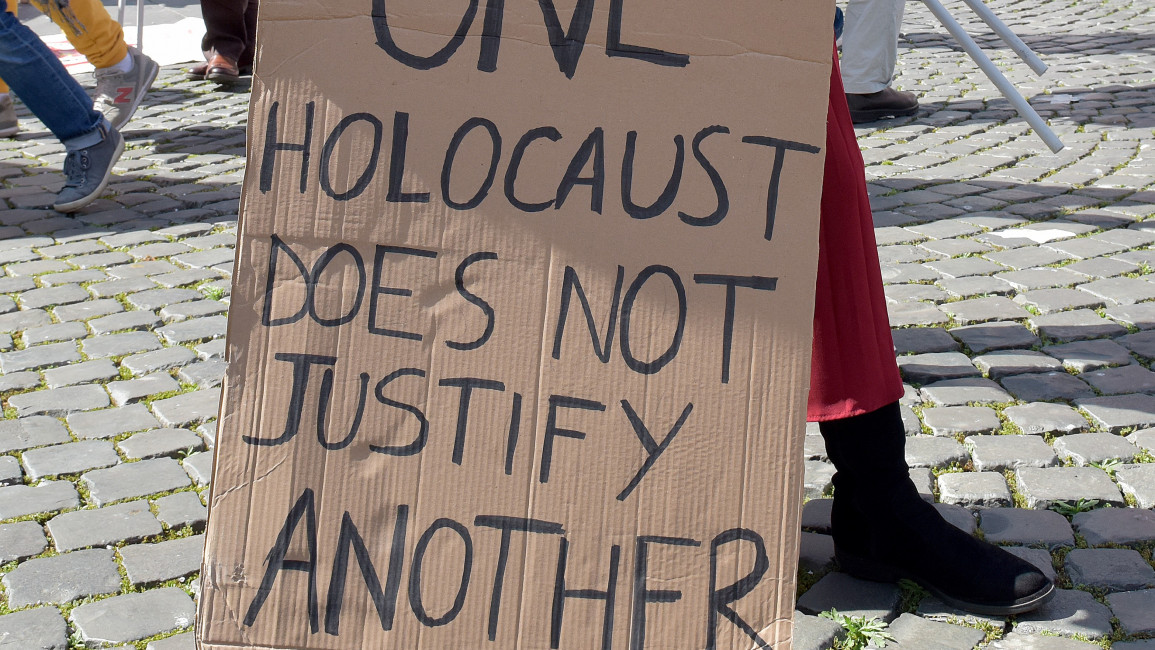
Mahmoud Abbas' Holocaust remarks: Statistically inaccurate, but a justified sentiment
"From 1947 to the present day, Israel has committed 50 massacres in Palestinian villages and towns," Abbas said in Arabic as he stood next to German Chancellor Olaf Scholz in Berlin.
"50 massacres, 50 Holocausts, and to this day, every day, [Palestinians] are killed by the Israeli army,” he added.
The comment was provoked by a journalist who asked whether the octogenarian Palestinian leader was going to apologise for the 1972 Munich attack, where eleven Israeli athletes were taken hostage by a Fatah-associated organisation. It resulted in the death of nine of them as clashes between the militants and Germany’s counter-terrorism units broke out.
Scholz, who stayed quiet at the time of the speech, did not wait long to lash out at Abbas, expressing “his disgust” at the Palestinian leader’s comment and condemning what he categorised as “the trivialisation of the singularity of the Shoah (Holocaust).”
"The Gaza Strip might not be Treblinka, but it is the world’s largest open-air prison, where the suffering of its two million inhabitants cannot be downplayed as less genuine than the Jewish suffering at the Warsaw Ghetto"
A similar condemnation came from Germany’s ambassador in Tel Aviv, Steffen Seibert, who tweeted that the comment was unacceptable and that “Germany will never stand for any attempt to deny the singular dimension of the crimes of the Holocaust.”
Israeli responses were similar both in tone and meaning, describing the Palestinian leader as a Holocaust denier, or at best, insensitive to Jewish pain.
It is not a secret that the Shoah has been a centrepiece in Israel’s foreign policy, certainly in terms of garnering Western support. Germany in particular sees its relations with Israel as special because of and despite Nazi Germany’s mass murder of millions of Jews, as well as - declaredly - based on “shared Western values” with Tel Aviv.
Time and again, former Chancellor Angela Merkel - who visited Israel seven times - emphasised Germany's special historical responsibility for Israel’s security. The view is that the Jewish state represents the homeland of the Shoah survivors, effectively standing as the physical mirror of Germany’s historical guilt and today’s moral compass.
In Berlin, pro-Palestine protests were banned and activists were attacked by police for wearing keffiyehs. @MattUnicomb examines how this marks a new level of repression in an already hostile environment 👇 https://t.co/DSb8j1YUet
— The New Arab (@The_NewArab) May 28, 2022
Since the 1950s, Germany has set out on a path of restitution toward Israel, commencing as financial reparations and continuing today as also logistical and military support, the last of which was the sale of German nuclear-capable submarines to the Israeli navy.
Germany’s position on Palestine is effectively a derivative of its views of and ties to Israel. As such, it has long supported the two-state solution and is deemed one of the EU’s main donors to the Palestinian Authority, a prospect that ultimately serves Israel’s security.
For the same purpose, Berlin has been upping its anti-Palestinian efforts on German soil, cracking down on Palestine rights activists, journalists, and academics, as well as incriminating BDS. In May this year, Berlin police imposed a blanket ban on Palestinian gatherings scheduled in the city to commemorate the Nakba 74th anniversary, deeming them “potentially anti-Semitic.”
From a German perspective, Abbas’ remarks disrupted Germany’s self-appointed guardianship over the Shoah legacy, not only by - as a writer cynically remarked - “violating Germany’s monopoly of the Holocaust copyrights,” but also because of the sheer statistical preposterousness in the comment.
However, to think of the problem in terms of statistics is to overshadow the significance of Abbas’ emotional outburst. He specifically projected the Palestinian utter desperation and impatience over Israel’s seemingly endless colonialism and military occupation.
The Gaza Strip might not be Treblinka, but it is the world’s largest open-air prison, where the suffering of its two million inhabitants cannot be downplayed as less genuine than the Jewish suffering at the Warsaw Ghetto. Neither is West Bank Palestinians’ resistance to Israel’s daily violations less legitimate than the Jewish anti-Nazi resistance.
The comparison is meaningless if measured strictly quantitatively; victimhood is a human condition, and the fact that Palestinians’ oppression is caused by a party that had been historically victimised does not make it less true or more justifiable.
But that is not all. Abbas’ emotional outburst highlighted the ever-persistent defensive and amateurish Palestinian attitude toward the Shoah.
"Belittling the Jewish genocide or/and denying it out of spite serves no purpose, save for fulfilling Israel’s long-sought goal of linking the Palestinians to Nazi crimes"
For many Palestinians, the relationship with the Holocaust is seen strictly through its political impact on their cause, as a tool that has provided Israel with “super legitimacy,” and therefore, impunity. Some fear that the Shoah has overshadowed Palestinian victimhood and continues to conceal Israel’s expanding perpetrator role.
Edward Said once said that the Shoah “…was a uniquely powerful narrative with which to garner support, and the Palestinians had no equivalent.” Palestinian poet Mahmoud Darwish whimsically remarked that Palestinians are famous because of the world’s interest in the Jewish problem.
This defensive mentality largely accounts, among other things, for the wide rejection of the UNRWA 2009 plans to teach children in its Gaza-based schools about the Holocaust. It also explains the uproar a few years ago against Al-Quds University’s professor Muhammad Dajjani for organising a trip for Palestinian university students to Auschwitz. He defended the step as a way for Palestinians to see where Jewish-Israelis come from, and to understand how to engage them.
Whether Abbas’ statement was a slip of tongue, although this is certainly is not his first time, the fact remains that the Shoah is only relevant in Palestinian history inasmuch as it played a key role in the production of the Nakba, and because it continues to provide Israel with impunity.
Normalising the Shoah in Palestinian lives, without indulging it, is simply an acknowledgement of a historical human tragedy. It does not delegitimise the Palestinian struggle for self-determination nor negate Israel’s responsibility for the Nakba and the series of massacres and atrocities since. It does not change the occupied-occupier dynamic or legitimise Israel’s occupation either.
In contrast, belittling the Jewish genocide or/and denying it out of spite serves no purpose, save for fulfilling Israel’s long-sought goal of linking the Palestinians to Nazi crimes.
Think of Benjamin Netanyahu’s 2015 outlandish claims that the Mufti of Jerusalem, Sheikh Amin Al-Husseini, conspired with Hitler to implement the Final Solutions. In other instances, Netanyahu said BDS was reminiscent of Nazi Germany’s campaign against Jews, and Yair Lapid, then Israel’s finance minister, likened BDS activities to the Mufti’s collaboration with Germany in the 1940s.
The obsession with connecting the Palestinians to the Shoah also led the editors of the Encyclopedia of the Holocaust to dedicate to the Mufti an article twice as long as the articles on Goebbels and Goering, and longer than the articles on Himmler and Heydrich combined. It is exceeded in length, only slightly, by the entry for Hitler.
"Abbas' comment was a desperate cry for help, but did not necessitate a '50 holocausts' analogy to highlight Israel’s oppressive policies"
Today, at Israel’s Yad Vashem Holocaust museum, the tour of remembrance is concluded by a wall dedicated to the Mufti’s connection with the Nazis, as if to say ‘there is much in common between the Nazis’ plan to destroy the Jews and Palestinian enmity’.
Abbas’ comment was a desperate cry for help, but did not necessitate a “50 holocausts” analogy to highlight Israel’s oppressive policies.
Israel’s criminal record speaks much louder than its claimed innocence and manipulation of Jewish historical traumas.
Dr Emad Moussa is a researcher and writer who specialises in the politics and political psychology of Palestine/Israel.
Follow him on Twitter: @emadmoussa
Have questions or comments? Email us at: editorial-english@alaraby.co.uk
Opinions expressed in this article remain those of the author and do not necessarily represent those of The New Arab, its editorial board or staff.




